Timid and rapidly grown prostitutes
« previous post | next post »
Apparently the international branch of the Bèn School of Translation has landed a contract with a certain cruise line to translate their menus. Here is the first of six buffet items, which begins innocently enough in English as "Chicken and Mushroom Tart":
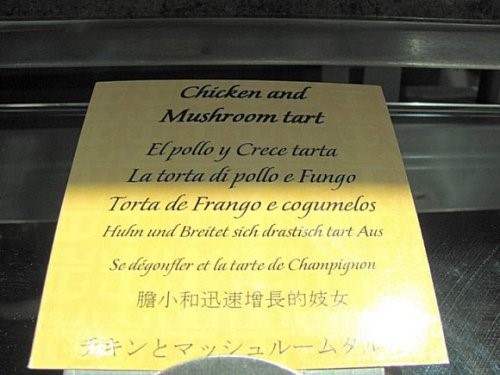
The translation stumbles right out of the gate in Spanish, where mushroom has apparently been interpreted as a verb and translated as the imperative form Crece "grow!", so that the whole thing becomes a surreal conjunction of a noun phrase and a food-directed order: "The chicken and Grow, tart!"
Analogous but oddly diverse problems afflict the other six languages. In French, for example, mushroom remains a noun and is translated correctly ("Champignon"). But this time chicken has turned into a verb, as in "chicken out", which rather loosely translated as se dégonfler, literally "to deflate" and figuratively "to lose one's nerve", so that the dish becomes "To lose one's nerve and the tart of mushroom".
And in Chinese, the two named ingredients and the resulting dish have all cast off their lexicographic moorings, with results that veteran readers should be able to predict:
Dǎnxiǎo hé xùnsù zēngzhǎng de jìnǚ
膽小和迅速增長的妓女
Timid and rapidly grown prostitute(s)
The basic Bèn School Method seems to be to look each content word up in a bilingual dictionary, and to pick the most amusing and least grammatical option among the alternatives on offer. The word order of the translation seems to be a semi-random compromise among the various languages involved.
Let's see what else is available on the menu. Here's the next item:
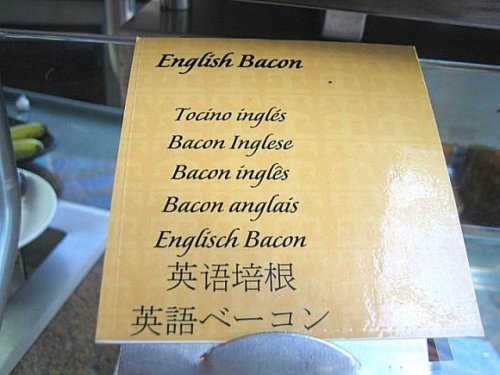
This time the Chinese version is not nearly as poetic, though it's still wrong:
Yīngyǔ péigēn
英語培根
English (language) bacon
The Japanese just below is the same. Now that you're getting the hang of it, I'll leave it to others to try their hand at the remaining items on the menu, for which I offer only photographs and no explanations.
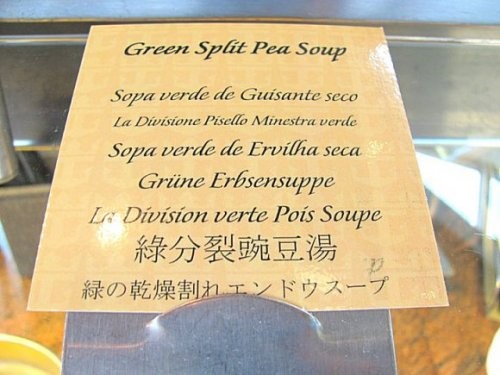
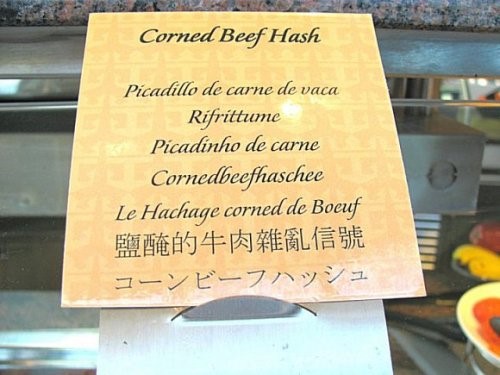
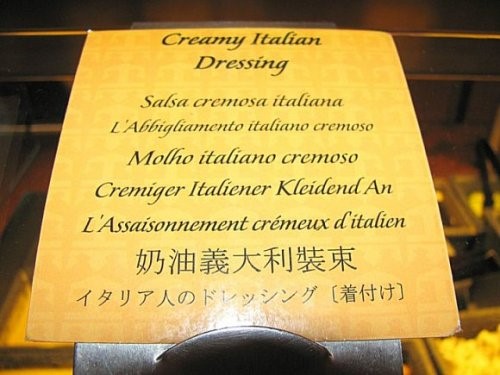
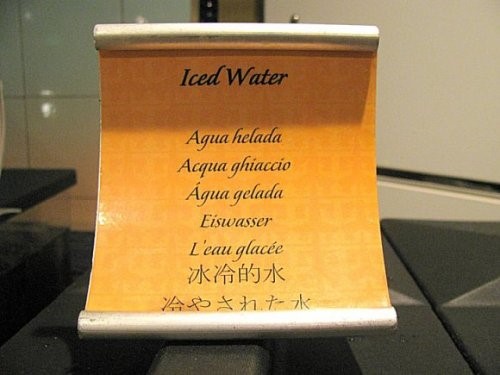
All of these delectables leave one drooling and dumbfounded.
[Thanks to Lareina Li and Jonathan Smith for independently sending me the complete set of photographs, apparently derived from this source.]
Tom S. Fox said,
June 2, 2011 @ 6:27 am
In the German translation, “mushroom” has also been interpreted as a verb and translated as “expands rapidly.”
Gary said,
June 2, 2011 @ 6:48 am
Even more puzzling, the German version evinces real competence in handling German syntax. The separable prefix of the verb ausbreiten is moved to the end of the sentence. (Similarly kleidend an for dressing).
So it's more than just a dictionary lookup. The knowledge of syntax but inability to distinguish verb from noun argues very strongly for machine translation.
I was surprised to see that both Babelfish and Google recognized mushroom as a noun.
biagio said,
June 2, 2011 @ 6:52 am
Tartina di pollo e funghi
Pancetta inglese (?).
Purée di piselli.
“Rifrittume”?!? Maybe it's "pasticcio di carne lessa".
“Salsa cremosa italiana” does make sense grammatically speaking, but I’m afraid it doesn’t make sense in a recipe.
“Acqua ghiaccio” is sheer crap (acqua ghiacciata? cubetti di ghiaccio?).
Gio said,
June 2, 2011 @ 7:01 am
Hi Biagio,
“Salsa cremosa italiana” is the Spanish, not the Italian translation.
The Italian translation is funnier:
"L'abbigliamento italiano cremoso"
(Creamy Italian Clothing)
Keith Ivey said,
June 2, 2011 @ 7:05 am
Is "bacon" missing from the Italian, Portuguese, French, and German dictionaries? Perhaps it's being interpreted as a reference to Francis or Roger.
sam said,
June 2, 2011 @ 7:32 am
Those creamy Italians, always at the forefront of fashion.
chris said,
June 2, 2011 @ 7:58 am
It's clear how certain alternate meanings of "chicken" and "tart" contributed to this, but how hard would it be to pick the meanings that are appropriate to the item being translated?
One thing about this series, though, it demonstrates how widespread polysemy is in natural languages. (Especially for words that can be multiple parts of speech, such as "chicken", "mushroom", and "tart". Although I guess you could say that all English nouns can be multiple parts of speech, because they can be used attributively. In some languages that kind of usage has to be marked with inflection or a preposition.)
biagio said,
June 2, 2011 @ 8:13 am
Bacon=pancetta
But it's used even as such, "bacon".
Sven O'Barn-Red said,
June 2, 2011 @ 8:17 am
@Keith Ivey
At least in Brazilian Portuguese, "bacon" is of current usage. There is also "toucinho" and "torresmo", but the cut used in sandwiches or American style breakfast is always called "bacon".
(I'm speaking from my experience as a native speaker,and might be wrong )
Bobbie said,
June 2, 2011 @ 8:28 am
IF "the basic Bèn School Method seems to be to look each content word up in a bilingual dictionary, and to pick the most amusing and least grammatical option among the alternatives on offer," then there should be a reference to cannabis among the translations of Hash. That is one of the American English usages of the word.
Randy E said,
June 2, 2011 @ 8:53 am
The translation into French of Split Green Pea Soup doesn't seem right to me. In fact, Split Green Pea Soup even sounds awkward to me in English. I've only ever heard Split Pea Soup and Pea Soup.
I don't think "division" is the right translation for "split" here, although in other contexts it easily could be. Besides, an adjective is needed here, not a noun. I don't know what the right one is.
Pois is masculine plural, whereas verte is a feminine singular adjective, and adjectives usually come after nouns in French, so green pea would more likely translate as pois verts, not verte pois.
I'm not sure how you would translate "pea soup", or "split pea soup", but I'm quite certain the given translation isn't it.
Ronald Kyrmse said,
June 2, 2011 @ 9:05 am
Mysteriously, the Portuguese translations are the only ones always right on the spot. Even "bacon" is good Portuguese. We _do_ have "toicinho" / "toucinho", but the crisp variety is always called "bacon" – at least in Brasil.
Then again, if the signs come from (say) a Brasilian or Portuguese environment, maybe the good translations are no translations at all, but the originals!
Dan T. said,
June 2, 2011 @ 9:23 am
The Chinese and Japanese translations of English Bacon use the same first character.
JR said,
June 2, 2011 @ 9:29 am
I wonder how their Japanese customers react to the knowledge that they've been turning hapless Italian people into salad dressing.
JR said,
June 2, 2011 @ 9:33 am
@Dan T, the first character means "English" (Japanese "ei") and the second character means "language" (Japanese "go"). I believe the second character is the same, too, but using the Chinese simplified form and the Japanese traditional form.
Perhaps it is merely a helpful gloss, to inform their customers that the word "bacon" derives from the English tongue.
Leonard Zelig said,
June 2, 2011 @ 9:41 am
Creamy Italian Dressing is translated into German as
(a) Creamy Italian (who is) dressed (i.e. not naked)
Henning Makholm said,
June 2, 2011 @ 10:01 am
@Gary, I'm not sure machine translation can explain all of the madness. A machine could know that "ausbreiten" can split "aus" off, but then why would it think that the "aus" fragment needed to be capitalized? And is such splitting even supposed to happen with the present participle? Mu memories of half-forgotten German classes suggest it ought to be "ankleidend(er)".
I'd say it is somebody who knows a little German and is simply trying too hard here.
Kimi said,
June 2, 2011 @ 10:32 am
For the Spanish translations, carne de vaca translates as "cow meat," instead of carne de res, which would be beef.
Also, crece isn't necessarily a command, it could also be the third person singular, but there are bigger problems at hand. Chicken and Mushroom Tart would be "tarta de pollo con champiñones." The translation as it stands not only bizarrely reverses the syntax, but also inserts an unnecessary definite article, making it literally "The chicken and Grows(or Grow!), tart." The other Spanish translations are reasonable, if not very natural.
Jean-Sébastien Girard said,
June 2, 2011 @ 11:03 am
@Randy e
You won't ever find this in a European dictionary because it's (ewwww) Quebec cuisine, but we do have "Split green pea soup" and we call it "Soupe aux pois cassés" (lit. "broken pea soup").
Anke said,
June 2, 2011 @ 11:14 am
Yes, it should be "ankleidend"… well, ", sich ankleidend", to be precise.
That they translated Italian to mean "Italian man" is the funny bit, though.
When menu translators go feral: “Timid and rapidly grown prostitutes” « Quotulatiousness said,
June 2, 2011 @ 11:27 am
[…] Victor Mair finds the menu items lost something, but gained humour, in the translation: […]
Chris Kern said,
June 2, 2011 @ 11:38 am
The Japanese ones are interesting because sometimes they are fine (Corned Beef Hash and Chicken Mushroom Tart), but others are wrong (the Italian dressing is Italian Person's Dressing). The last one is understandable but not the normal word for cool water (冷や水 or 冷水). For the Split Pea Soup they tried to translate each word and came up with a mess; to the extent that Japanese people would be familiar with that soup, they would know it as just a straight transliteration of the English words (sometimes as "green split soup")
It's tricky business when you're not familiar with what words from your own language are known in others. I've had many experiences with Japanese people trying to translate words into English like "tsunami", "sushi" and "kimono" that English speakers understand more readily than whatever you can come up with ("traditional Japanese clothing" or whatever).
Charles Gaulke said,
June 2, 2011 @ 1:46 pm
It seems likely that the translator wasn't a native speaker of English, and didn't understand the originals (assuming English was the original), just based on the fact that many of the pea soup translations refer to the soup, rather than the peas, as green. That seems like a parsing issue rather than lazy/creative dictionary usage.
Charles Gaulke said,
June 2, 2011 @ 1:48 pm
Or, I could have misread the English while skimming and assumed it was (more common where I'm from) Split Green Pea Soup rather than what it actually is. Oops.
Martin said,
June 2, 2011 @ 1:56 pm
@Kimi
In my experience, "carne de vaca" is widely used and understood among native speakers of Spanish (at least of the rioplatense variety).
Lane said,
June 2, 2011 @ 2:27 pm
Yeah, what Gary said about the German – "sich drastisch ausbreiten" ["to spread dramatically"] is how someone has translated the verb "to mushroom". But amazingly, in putting it in place, they removed the "aus-" and moved it to the clause-final position, which is where it's supposed to be. But what kind of MT would see "chicken and mushroom" and not realize that if the first was a noun the second was pretty likely to be as well?
Also "tart", the English noun, is translated into German as "tart", an adjective, means the same as the English adjective "tart" (making you pucker), rather than the German noun Torte, which means a pastry-based dish.
So this three-noun NP in English is translated as one noun, one verb and one adjective, and the noun properly translated as a noun was not the head noun.
Worst. MT. Ever.
Louisa said,
June 2, 2011 @ 2:51 pm
The French translations, for the curious:
La Division verte pois soupe = The green Division soupe pea
Should have been: Soupe au pois cassés verts [although that sounds as awkwardly long as the English version]
Le Hachage corned de boeuf = …okay this one's impossible because "corned" isn't a word in French that I've ever heard of and "hachage" can mean cutting (as in hay) or hashing (as in computers).
Should have been: Hashis de "corned-beef" [in Quebec] OR colloquially "le singe" [in France].
l'Assaisonnement crémeux d'italien = the Seasoning creamy of an italian [object, not person]
Should have been: Vinaigrette cremeuse Italienne
They managed to not fuck up the iced water, and bacon in French is indeed bacon.
Honestly, I have no idea how they did this, because google translate would have done a better job.
(N.B. My translations above are based on Quebec French unless otherwise indicated.)
Louisa said,
June 2, 2011 @ 2:55 pm
Correction: that should be "the creamy Seasoning of an italian"
KevinM said,
June 2, 2011 @ 3:31 pm
@Gio. I can't keep Italian food off my clothing, but apparently the Italians can't keep the clothing out of the food.
I recall a restaurant in Ravenna that translated "marinara" as "at the sailor suit."
Jacob said,
June 2, 2011 @ 4:27 pm
The real question is: do members of the Ben school of translation experience 'the bilingual advantage'?
Z Lu said,
June 2, 2011 @ 6:16 pm
I like how the Japanese translation explicitly states that the "Italian man's dressing" is a "piece of clothing" in the parentheses.
DRK said,
June 2, 2011 @ 6:23 pm
Isn't the split pea soup "Potage St. Germain", or does that only refer to soup made with fresh peas?
I speak only the sketchiest of French, and only know this term because of the Joy of Cooking. Irma Bombauer recounts the New Yorker cartoon about lunchtime in prison, when a convict spots the steaming tub of mystery food and cries, "Aw, shucks, puree St. Germain aux croutons again!"
Paolo said,
June 2, 2011 @ 6:29 pm
I wish I weren't imagining a scenario where the timid prostitutes are ready to service the members (sorry) of the Italian divisione pisello.
Pisello means "pea" but it is also the most commonly used colloquial word for "penis"; divisione followed by a noun suggests a military meaning…
Bea said,
June 2, 2011 @ 7:48 pm
@Martin,
"Carne de vaca" is understood (probably the same way "cow meat" would be in English) but, at least in my region, "carne de res" is much more natural and common. Perhaps it's one of those regional things.
Mr Punch said,
June 2, 2011 @ 8:23 pm
A native speaker of Portuguese, with some knowledge of English and German, assisted by MT?
Ethan said,
June 2, 2011 @ 9:51 pm
Shouldn't have left ice water for last… after the rest, it was such a letdown!
Amused said,
June 3, 2011 @ 1:16 am
In Chinese, it seems like it's called "Destiny Split Pea Soup". Looks like that soup was meant to be.
Also, Corned Beef Hash is translated literally as, "Salted *something I couldn't find* beef fried disordered/confused signals". Whaaa?
Charly said,
June 3, 2011 @ 1:58 am
"Lard" is the France-French word for bacon. "Bacon" means smoked back bacon; i.e., what we here in the USA call "Canadian bacon." I have never, ever heard the term "English Bacon before: some Googling seems to reveal that it may indeed mean "back/Canadian bacon" . . . so they might have been halfway right, through luck. :P
No adjectives necessary, though.
WordReference had a whole discussion about someone's befuddlement over "corned beef hash." :)
http://forum.wordreference.com/showthread.php?t=918260
Look at the terms the Frenchies use to get an idea of (a) how completely foreign this dish is to them; (b) what they would call it. Also learned a new word: ortolan, a fancy-pants olde-timey bird dish.
This would be a very good exercise for an Indo-European language translation class. A Chinese translation class might just cry trying to fix that, and should just start over!
Charly said,
June 3, 2011 @ 2:02 am
Anyone else feel sketchy about the "iced water"? I suppose it is that, but just as it became "ice cream" through sound-lobbing-off, "ice water" sounds and looks a million times more natural to me.
Anon said,
June 3, 2011 @ 2:44 am
Oh. My. God. The Chinese is hilarious. I don't know how something could possibly go that perfectly wrong, it almost seems intentional. I don't know if I'll ever make fun of Chinglish again.
Jo said,
June 3, 2011 @ 3:28 am
Rifrittume is not the name of a dish; literally, it would mean a bunch of leftovers jumbled together and refried–not an appetizing image, especially since the suffix -ume is pejorative. But I've only ever seen it used in a metaphorical sense, i.e., a bunch of rehashed ideas.
GeorgeW said,
June 3, 2011 @ 6:37 am
@Charly: Yes. I (Southern AmE) have never drunk 'iced water' or 'iced tea.' But, I have had a lot of ice water (and tea) in my life.
Lareina said,
June 3, 2011 @ 7:21 am
LOL
the Japanese for 奶油意大利装束 is so funny esp when you see 着付
michael farris said,
June 3, 2011 @ 7:56 am
I would probably write 'ice water' but 'iced tea' but at normal speed iced tea and ice tea will sound the same.
This Week’s Language Blog Roundup | Wordnik ~ all the words said,
June 3, 2011 @ 8:04 am
[…] for the brain, and in may in fact be an advantage. While that may be true for most people, this translator of cruise ship memos, pointed out by Language Log, seemed to have trouble (“Timid and rapidly grown prostitutes, […]
John Swindle said,
June 3, 2011 @ 8:16 am
If anyone is getting confused signals about the salty beef, Google translates Chinese "鹽腌的牛肉雜亂信號" as "Corned beef hash"! Fortunately I'm vegetarian.
An American from the Plains, resident in Hawaii, I have "ice water," "iced tea," and "shave ice," and thought the Chinese for the first was "冰水"。
GeorgeW said,
June 3, 2011 @ 8:30 am
@michael farris: Your intuition about water and tea may be generally correct.
There is a Wikipedia article about 'iced tea' (http://en.wikipedia.org/wiki/Ice_tea) that says, "sometimes known as ice tea." In it, there is a picture of a what is labeled as "Nestea and Lipton Iced Tea,' but the Lipton bottle says "Lipton Ice Tea."
There is also, believe it or not, a Wikipedia article about 'ice water' (http://en.wikipedia.org/wiki/Ice_water). It does not mention an 'iced water' variation.
[(myl) Richard Faust, in Columbia Magazine, 11/83, points out that there is
a historical tendency for the -ed ending to drop in commonly-used
terms that start out as phrases of the form Verb-ed Noun:
]
Kimi said,
June 3, 2011 @ 11:11 am
@Bea I agree on the regional thing. In Mexican Spanish, carne de vaca, while understandable, sounds distinctly weird (and unappetizing).
RP said,
June 3, 2011 @ 11:18 am
As a Brit, I say "skimmed milk" and regard "skim milk" as American. In my mind I associate it with the fact that we say "rowing boat" while Americans have "rowboat".
I am not familiar with such a thing as "ice(d) water", but I gather it is another name for what I would call "water with ice", in which case "iced" seems the more natural spelling to me.
Andrew (not the same one) said,
June 3, 2011 @ 11:33 am
I wonder if forms like 'ice water' are more common in places where these things are more of a regular part of life (i.e. in hot climates).
Ellen K. said,
June 3, 2011 @ 1:17 pm
For me, both ice water and iced water are odd. It's a glass of water. The ice is taken for granted. At least as far as restaurants goes. At home I'd probably add "with ice" if I ever bothered to put ice in my water.
GeorgeW said,
June 3, 2011 @ 2:12 pm
In the American South, it would be very strange to be served a glass of water at room temperature. In fact, the idea is a bit revolting to me. And, with ice would be preferable to chilled without ice. So, in a sense, a glass of water and a glass of 'ice water' mean the same thing.
In the Middle East and South Asia, cold water is often thought to be unhealthy. We have offered 'ice water' to workers around our house in 100+ degree weather and had it refused or requested without ice. Yuk!
G.K.Subbarayudu said,
June 3, 2011 @ 2:25 pm
In Hindi: Itlii kapda malai-maar ke
phataa matar shorva hariyaali
(Phataa as in split/phataa doodh/virigina paalu ;though syntactically there is no difference; or, perhaps, since hariyaalii is shifted, the adverbial becomes the adjectival .
Angrezi suvar ki gosht
(particularly apt in the postcolonial context :read– English pig's meat with the obvious English-pig contempt)
Makkai gosht-bhainsa bhangda
(this is probably closer to Punjabi including the name of the popular Punjabi dance )
G.K.Subbarayudu said,
June 3, 2011 @ 2:37 pm
In Telugu: Venna poosina itali batta kattu
aaku pachcha mukka bathaanii pulusu
(mukka= stale)
Mokkajonna goddu maamsapu kalagalupu
Peter Taylor said,
June 3, 2011 @ 3:21 pm
@Charly, "iced water" seems plausible to me (although in a restaurant I would label it "water" and leave it to the clients' observational skills to spot the ice-cubes and intelligence to realise that they're ice; I don't have a specific term to refer to drinking water with ice in it). "Ice water" conjures images of water which has been frozen and melted. I'm a native en-gb speaker.
Peter Taylor said,
June 3, 2011 @ 3:30 pm
To make this a bit more scientific (although the numbers are rather low), BNC gives 36 hits for iced water vs 10 for ice water.
Going through MYL's list above, shave(d) ice and cream(ed) corn appear to be unknown in en-gb; popcorn has a monopoly (80-0); as does ice cream / icecream (471 + 28 – 0); and roast beef dominates roasted beef (71-2). The rest favour the older version; skimmed milk wins 102-1; waxed paper 18-4; iced tea 15-4; and whipped cream 56-10.
Elise M said,
June 3, 2011 @ 8:44 pm
Another Hawaii resident! I am enjoying this ice(d) water/tea discussion.
When I was a student taking a class on Pidgin (Hawaiian Creole English), our professor explained this as something unique to Pidgin, arguing that the "ice" was modifying the "shave" and not the other way around, and it was really shave (noun) ice(d) (verb). However, this was the only example he could provide of this kind of switching happening…
Bernie said,
June 4, 2011 @ 1:34 am
"In the Middle East and South Asia, cold water is often thought to be unhealthy. We have offered 'ice water' to workers around our house in 100+ degree weather and had it refused or requested without ice. Yuk!"
Well, too cold a liquid can be a shock for the stomach. Otoh, drinking something warm causes a bit of additional sweating, which ultimately has a cooling effect. So there you go for the why ;)
John Swindle said,
June 4, 2011 @ 2:09 am
MYL, I realize you're quoting Richard Faust, but would you accept a second question mark beside "shaved ice"? The trouble with shave ice originating as "shaved ice" is that Hawaii English wouldn't necessarily bother with the "-ed". Stores have signs in the window saying they're "open" or "close", and ice or anything else would as likely be "shave" as "shaved".
Elise M., if your old professor's "shave ice" is Pidgin (HCE) "shave (noun) ice(d) (verb)," then what about "crack seed"?
kktkkr said,
June 4, 2011 @ 11:32 am
I like the fact that the Japanese for "corned beef hash" is practically perfect due to the fact that it's just transliteration/transcription.
On the other hand, I will never look at creamy Italians dressing the same way again.
Rodger C said,
June 4, 2011 @ 12:19 pm
I frequently see "stain glass," but then I live in a region known for apocopation and Christianity.
Elise M. said,
June 4, 2011 @ 9:39 pm
@ John Swindle:
I don't think anyone in Hawaii would naturally interpret "crack seed' as crack (noun) seed(ed?) (verb), jokes about it being delicious or addictive aside. It seems much more likely that it's another example of the general tendency to drop or not have inflectional endings on verbs in Pidgin.
John Swindle said,
June 4, 2011 @ 10:39 pm
@Elise M:
I agree completely.
bryan said,
June 5, 2011 @ 2:47 pm
信號 = "signal" in Chinese, and has nothing to do with hash, which should be 雙叉符, if talking about # sign, as on a computer or the phone. "Hash brown" is translated as "薯餅" in Chinese, where 薯 = potatoes, in Cantonese, whereas 餅 is used for "pastry" besides its usual definition of "cookies / crackers". Anything with a filling could also be called 餅. Sometimes 西餅 is used for a cake, as in "birthday cake", rather than 蛋糕, which literally is a snack item [糕 點] made with eggs [蛋]. But hash as in "hashed meat" could = 肉餡餅, which is the same translation as "patty", but certainly not 信號!
bryan said,
June 5, 2011 @ 3:03 pm
豌豆湯 = correct for "split pea soup" but why the added unnecessary 分裂 in front of it which doesn't translate to anything at all and should be omitted?
綠豌豆湯 / 青豌豆湯 is sufficient for "Green split pea soup", for "split" need not be known in Chinese, due to bad connotations with 分裂, which means "to part, to separate" as among married couples!
In describing foods, 綠 is rarely used, especially if it has a tendency to confuse. Most of the time, 青 is used to translate "green" in English instead. Exception: 綠豆, which means "green beans". Using 綠 here would confuse the heck out of a lot of Chinese people.
Since pea & bean, tend to be a form of 豆 when categorized in Chinese, and the fact that they're both green in color, might really cause some problems. 豌豆 by itself = peas
The people at Ben's school really have no training for professional interpreters at all? If anything, check with the people who DO speak these languages, and don't blindly trust any online translation dictionaries. C'mon?! This is a get rich quick scheme, don't buy into it!
bryan said,
June 5, 2011 @ 3:18 pm
Can't people use common sense and think "Dressing" is not a verb. It's a noun! As in "salad dressing"! Come on. It's 沙拉醬: 沙拉 = "salad". Could be used to translate "Sara / Sarah", too. 醬 = sauce, also used as "dressing etc…"
It would be funny it they did have it correct as 沙拉醬, but translated it as "Italian Sarah dressing" [all the guys would be looking for Sarah?! or is that Sara, she's Italian, you know?] or better yet "Sarah's Italian dressing".
bryan said,
June 5, 2011 @ 3:40 pm
Chicken & Mushroom tart:
膽小和迅速增長的妓女:
Literally = The speedy growing prostitute with no guts!
They used Chinese slang and translated 雞 as "prostitute"?
The chicken is gone.
膽 is wrongly converting the oral "dan" written in "shorthand" as 旦 by waiters & waitresses in Chinese restaurants, which should be corrected as 蛋, but Ben's scholarly interpreters unfortunately phonetically wrote down "dan", but didn't write down the meaning, otherwise they would not use 膽, which means "gallbladder" in Chinese! 膽小 = "having no guts" in Chinese. Rather than writing 蛋, where 小 could be omitted. 迅速增長 = "speedy growth", no doubt they mistranslated the word Mushroom in Spanish and translated "growth" into Chinese via Spanish!
So the mushroom is gone.
胆 = simplified form of 膽 in Chinese.
Eggs are there but only in your head.
Now, with everything said, I still have yet to see "the tart". It never appeared. I feel like having a "Waiting for Godot" moment.
You mean to tell me the eggs are in my head, the chicken became a whore, there's a growing mushroom which I just can't see, and the tart disappeared and what am I still waiting for?
Waiter/Waitress/ Steward / Stewardess:
I'll have "The speedy growing prostitute with no guts" please. Thanks but no thanks.
bryan said,
June 5, 2011 @ 4:01 pm
English bacon: It's a type of food. You don't translate verbatim for this!
英國煙肉
English is a description, meaning it's "From England", and nothing else and has nothing to do with the English language, which they translated as 英語, which is one of many ways of writing "The English language" in Chinese.
培根 used for the food "bacon" is derived from the last name Bacon in English, and so Chinese followed suit. Bacon is actually translated as 煙肉 in Chinese, literally "smoked meat".
I'm wondering how they'd write "The English guy named Francis Bacon" in Chinese?
bryan said,
June 5, 2011 @ 4:16 pm
From the link:
Regular milk become "Milk with regulations" in Chinese.
Tropical juice becomes "Juice from the tropics" in Chinese.
Half & Half = "Mixture of milk two each half " in Chinese.
Ham and Bamboo salad = "Stupid actor/actress and bamboo salad" in Chinese. They actually got the word "salad" correct there, but how come with the salad dressing, the translation is so disastrous?
Garden Greens = "The garden becomes green" in Chinese. Is it still edible post-translation?
Note: Some translations are in Traditional Chinese and some in Simplified Chinese.
Peter Taylor said,
June 5, 2011 @ 6:01 pm
Bryan wrote:
Amused glossed part of that sign as "disordered/confused signals", which caused me to assume that the word for hash which was picked was the cryptographic term for a one-way function (e.g. MD5, SHA). Is this the explanation, or am I barking up the wrong tree?
bryan said,
June 5, 2011 @ 11:02 pm
Peter Taylor wrote:
Amused glossed part of that sign as "disordered/confused signals", which caused me to assume that the word for hash which was picked was the cryptographic term for a one-way function (e.g. MD5, SHA). Is this the explanation, or am I barking up the wrong tree?
The word for "hash function" as in cryptography = 散列函數, therefore: 散列 = hash & 函數 = function.
One way function = 單方向函数,
Translation = the meaning from Japanese page in Wikipedia where the name of the function is in Kanji and I translated accordingly into Chinese.
Cath the Canberra Cook said,
June 5, 2011 @ 11:52 pm
Very funny! I love crazy menus, but usually I only see the bad English ones.
Bacon doesn't really translate, so I think that one's fair. Pancetta isn't really the same as bacon. Even American bacon isn't much like English bacon.
Randy E, I'd say "green split-pea soup" to distinguish it from "yellow split-pea soup". These different coloured dried legumes are both available in Australia and England.
Y. H. said,
June 6, 2011 @ 4:49 pm
There is something quite strange in the French version: one will never see an article in front of the name of a dish on a menu. At least in France and (French speaking part of) Belgium. Suffices to write 'Eau glacée'.
Well, the absence of article is somewhat traditionnal. It's true that in some `modern' restaurants one can stumble upon a `le médaillon de veau et ses petits légumes'. It sounds, at least to me (but not only to me), a bit ridiculous. Generally, `le médaillon…' costs more than the mere `médaillon…'.
marie-lucie said,
June 7, 2011 @ 12:02 am
split green peas: In France I never heard of split yellow peas. "Pois cassés" are assumed to be green. They are not usually made into soup but into a thick purée.
Charly: full-blooded Frenchie here:
ortolan, a fancy-pants olde-timey bird dish
"Ortolans" are actual birds, highly prized as food in past centuries..
"Lard" is the France-French word for bacon
But eating whole slices of bacon is not in the French tradition. "Lard" is typically diced and added to some other preparations in order to add flavour, and thin slices of the fat part can be used to wrap a lean piece of meat.
YH: the use of the definite article in menus is not "modern" but pretentious. It is seen not only in expensive restaurants but in ceremonial meals, such as a high-class wedding banquet or a formal dinner at the Élysée palace, where each place setting includes a copy of the menu. The article seems to indicate that the dish is very special and even famous, and it is often followed by a fanciful description which does not really reveal what the food actually is or how it is prepared. For instance, potatoes in their skins are often called "pommes de terre en robe des champs" 'potatoes in rural dress'. This is a relatively straightforward example, but the fancier the venue, the more inventive and opaque the description of each dish is.
Darrell said,
June 7, 2011 @ 12:14 am
bryan writes: "You mean to tell me the eggs are in my head, the chicken became a whore, there's a growing mushroom which I just can't see, and the tart disappeared and what am I still waiting for?"
mushroom = speedy growing
tart = prostitute
chicken = with no guts
I don't know why you were expecting eggs. Unless it's some sort of chicken-and-egg problem. ;D
John Swindle said,
June 7, 2011 @ 2:52 am
@bryan: I see what you mean, but I think Darrell has it right.
"Chicken" can mean "cowardly".
"Tart" can mean "prostitute".
No eggs. The menu translates English "chicken" as Chinese "膽小", which Victor has given as "timid".
Bruce Humes said,
June 11, 2011 @ 12:38 am
What a pity we aren't told WHICH cruise line is using such miserably translated menus.
After all, these cruises cost an arm and a leg. If they are offering up "timid and rapidly grown prostitutes" as foodstuffs, consumers have a right to know!
@boris_tweets said,
June 13, 2011 @ 3:48 pm
Japanese kanji with surprising Chinese meanings
http://whatjapanthinks.com/2011/06/13/japanese-kanji-with-surprising-chinese-meanings/
Micah S said,
June 18, 2011 @ 12:51 pm
Since this (surprisingly) hasn't been resolved yet, let me mention that nciku gives 杂乱信号 (literally "jumbled/mixed up signal") as:
The Random House Unabridged Dictionary (1997) gives the 5th definition of hash as:
So it doesn't take a stretch of the imagination to understand why that Corned Beef Hash would have been "translated" as 鹽腌的牛肉雜亂信號. Links:
nciku: http://www.nciku.com/search/zh/detail/杂乱信号/53278
dictionary: http://dictionary.infoplease.com/hash
Tian said,
July 20, 2011 @ 2:31 pm
I personally think using 培根 (cultivate root?!) as translation for "bacon" is so stupid.
How about 熏肉 or 鹹肉, which is what bacon actually are!
Observation said,
December 22, 2011 @ 3:40 am
I think 培根 means 'Sir Francis Bacon', or at least it's the only meaning here. I wouldn't want to eat 'cream with Italian clothes'!
TrekkieGrrrl said,
November 5, 2013 @ 8:27 pm
Interestingly, all of them translated correctly into Danish using Google translate. Well all but the Corned Beef Hash which was left untouched. But then again it's corned beef and it's hash.. both things known to Danes.